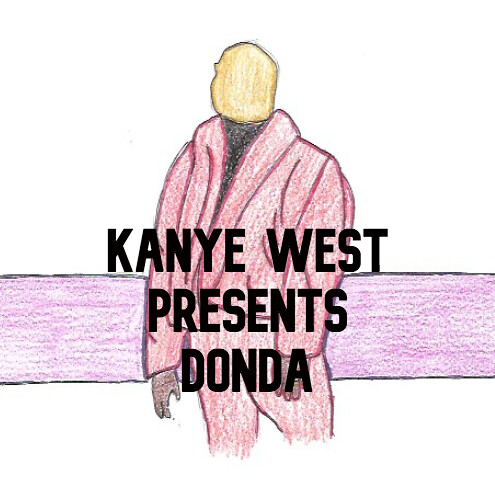Kanye’s “Donda” delivers… and disappoints

Amid controversy, Kanye West releases his highly anticipated tenth studio album, Donda.
September 27, 2021
The self-proclaimed god delivered. On Aug. 29, Kanye Omari West released “Donda”, a twenty-seven track record with a plethora of features. The album encapsulated all that Kanye is famous, and thus infamous, for. The album is fulfilling at some points, with the gospel theme perfectly aligning with the experimental nature of the track. However, some songs fall short, struggling to straddle the line, making them feel raw. It’s raw as in, “oh this track isn’t finished and needs more,” and not “Yeezus raw.”
Music aside, there are deeper undertones to “Donda” that confuse the listener. The album rollout was heavily affected by the Cold War-like beef between Ye and Drake, however, Kanye himself dedicated this album to his mother. Drake’s potshots at Kanye resulted in generating the hype for the rollout, but it felt tainted. Ye’s cheap responses to Drake, which included a confrontation on a group chat involving a meme from Joaquin Phoenix’s “Joker” are out of place regarding the nature of the rollout. The beef was a result of Pusha T’s diss track, “The Story of Adidon,” and Kanye’s alleged involvement in the production of said diss track. The album was now less of a tribute, and more of a rat race with Drake’s “Certified Lover Boy.” The heavy gospel tone and lack of cursing yields itself to be a bastion of being “holy,” yet he has employed Marilyn Manson, an accused rapist, and DaBaby right after his homophobic tirade at Rolling Loud. As a listener, I am content with the music presented, but as a person, I am conflicted by the message that this album delivers. Thus Donda poses the question: does the goodwill and tracklist in the album let the listener overlook the controversies surrounding the release and features of the album?
Album Rollout
Kanye Omari West is no stranger to the extravaganza. Three listening parties, rented out stadiums for album production and all-day live streams of Kanye’s room are testaments to his efficient, yet narcissistic marketing schemes. After the mediocre tracks of “Jesus is King’s” and the past mini-albums he had released in “Daytona,” “Ye,” and “Kids See Ghosts,” fans and critics alike were tensed at the edge of their seats for a new Kanye album. The album rollout kept fans engaged and allowed them to revel in this newfound experience of seeing an album be produced with them. In fact, they were the test audience. Mike Dean, Kanye’s sound engineer, confirms this in a tweet and lets us know that the album was consistently re-tuned after each listening party. When the album finally came out, there weren’t too many surprises regarding who was featured and what the album’s tone would be.
Come to Life
This is the piece de resistance of the album.
In the listening parties, the track was mostly an afterthought, overshadowed by “No Child Left Behind.” Of course, the two songs are very different. “Come to Life” is a story about rebirth, which in fact was represented visually by him setting himself on fire at the Chicago listening party. “No Child Left Behind” is a story about believing in God despite setbacks.
The production of the song itself isn’t anything groundbreaking, but the dreamy aura it gives off allows us to imagine the rest of the vibe. This revelation makes it so that one feels as if they are floating and their sins are forgiven. The song is slow and melodious.
The half-baked story Kanye attempts to tell while paying a heartfelt tribute to his mother is stronger in this track. It shows the listener that their sins are forgiven as long as they accept the higher power. In a way, this is done through Kanye’s journey himself. His tribute to his mother is completed by his transformation in accepting his faith. By coming full circle, the track allows the listener to attempt to transform themselves for the better, thus the saying, “Come to Life,” the “Life,” being the best version of themselves.
The track deserves to be in the upper echelons of Kanye’s career. It has earned its place alongside “Runaway,” “Ghost Town,” and “Bound 2.” Simply put, the ethereal feeling that the song gives covers up the cracks in the actual album.
Off the Grid and Jail
“Off the Grid,” the fourth track on the album, is what truly kicks off the dark and pensive mood. The piece features Kanye West, Playboi Carti, and Fivio Foreign, and has bars written by Pusha T as well. The beat itself is nothing special and is reminiscent of a classic, albeit hurried, drill beat. The song gives the listener a desire to power through their problems. The theme of the song is a sacrifice for the collective, as represented by the hook.
First off, let’s address the elephant in the room. The verse from “Fivio Foreign” is the equivalent of Jay-Z on “Monster,” or Rick Ross on “Devil in a New Dress.” It’s high praise, but he deserves it. The flow is smooth and the lyrics land hard and are on point with the tone. The hunger in the young artist’s voice reminds the listener of younger Kanye, and the lyrics represent his desire to be seen as such. Getting a feature from Fivio seems to get a bang for your buck these days as his performance in “Clueless,” by Polo G and Pop Smoke reached similar heights.
Playboi Carti’s high-pitched intervention in the second verse was not needed on this track. Pusha T or any other drill rapper such as Skepta would’ve produced an excellent verse on this beat instead. Carti feels lost, but his shorter verse ensures that the listener only has to see out his verse for a brief part.
Although “Jail” and “God Breathed” appear before this track, the experimental nature of the album truly shines through here. “Jail” itself was an excellent song, save for Jay-Z’s verse. For someone who prides himself on spontaneous lyrics, Jay-Z’s lyrics and flow were mediocre at best. Kanye’s vocals on “Jail” are excellent and represent the best part of the song. The song has heavy rock influences, and the 808’s are noticeable.
There are rumors that the song represents cancel culture, especially the second part. In the second part of the song, DaBaby and Marilyn Manson make an appearance. It is incredibly unfortunate that the brilliance and holy nature of the album is marred by the voices of these two. DaBaby is fresh off of his homophobic comments at Rolling Loud and Marilyn Manson is an accused rapist with multiple cases against him. Kanye’s decision to include the two on the track is difficult to understand. Does he want to show that forgiveness should be given alright? Is it a statement about cancel culture? Does he mean that Manson will literally go to “Jail”?
Whatever Kanye’s decisions are, the idea to include the two goes the exact opposite in the tone of the album. The album is supposed to be a tribute to his late mother. It’s supposed to be about God and acceptance. Manson and DaBaby on the album stain the experience and it doesn’t feel pleasant.
Final thoughts
What Kanye would be without controversy is a question many ask, but not many know the answer to. For an average fan, the music is always something different. It can be called revolutionary but the trouble that fans have to go through to get this music can be too much at times. Manson and DaBaby’s presence on this album is heavy, as with Drake, but as usual, the music takes center stage. The grim, gospel tune of “Donda” with a plethora of features is a candidate for album of the year. It has all of Kanye’s voices, but his gospel voice stands out. Certified hits such as “Off the Grid” and “Hurricane,” rule with star-studded features, but melodious tracks such as “Come to Life” and “No Child Left Behind” remind us of Ye’s softer side. Overall, this album is a flawed classic.
Rating: 8.02/10

